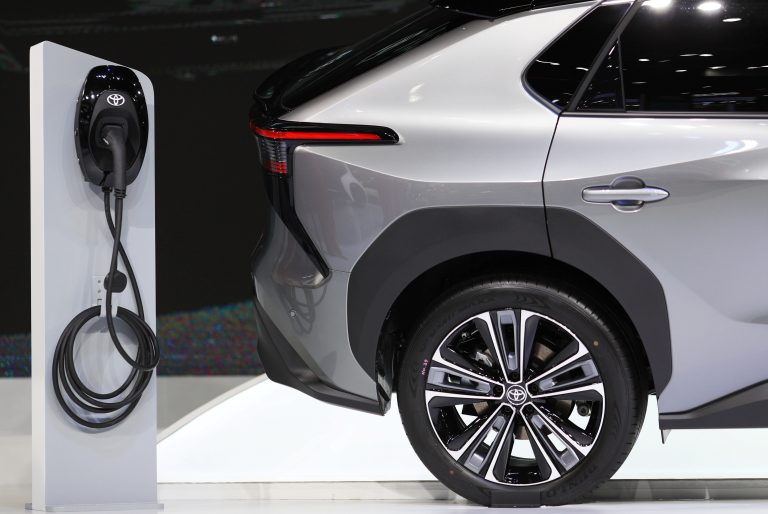Toyota has announced plans to launch high-performance solid-state batteries that are cheaper to produce for its fleet of electric vehicles (EVs) to compete with rivals such as Tesla.
The Japanese giant’s technology roadmap, covering aspects as varied as next-generation battery development and a radical redesign of factories, amounted to the automaker’s most complete disclosure of its plan to compete in the EV market.
Shares of the world’s best-selling automaker jumped 5 percent on the day to 2,173 yen, the highest since August last year.
The announcement came on Tuesday, June 12, a day before its annual shareholder meeting. The automotive behemoth outlined its plans to launch a new generation of lithium-ion batteries in 2026, which would last longer and be faster to recharge.
READ MORE:
- Tax Credits Push the Cost of Tesla’s Model 3 Down to Less Than $30,000 in Multiple States
- Toyota Expects Full-Year Output Cut Due to Chip Shortage
- Japanese Firms Partner Against Chinese Competition to Produce Home-built Electric Trucks
- Toyota’s Chinese Factory Shutters Because of Drought-induced Electricity Shortage
Success
You are now signed up for our newsletter
Success
Check your email to complete sign up
Toyota will hedge with better-performing lithium iron phosphate batteries, a cheaper alternative to lithium-ion batteries that have spurred EV adoption in China, currently the world’s largest vehicle market.
It also announced a technological breakthrough regarding the shelf life of solid-state batteries, which can store much more energy than liquid electrolyte batteries.
The group expects to bring the new generation of solid-state batteries to market in 2027-2028 and hopes that they will be able to deliver what their predecessors could not: range and thus address a significant consumer concern.
Still, the problem remains that such batteries are costly and will remain so for the foreseeable future.
Toyota wants to produce an EV for the top end of the market with a lithium-ion battery with more power and a range of 1,000 kilometers (620 miles).
That would be twice as much as the best-performing lithium-ion-powered Tesla Y, which achieves about 530 kilometers by U.S. Standards.
On the other hand, a solid-state battery could provide a range of 1,200 kilometers, Toyota said, and with a charging time of only 10 minutes, a Tesla Supercharger network takes 15 minutes to do, promising a driving range of 321 km, according to current standards.
‘We want to change the future’
Other innovations and recommendations adopted by the board under new CEO Koji Sato involve using electric axles based on technology from supplier companies such as Aisin and Denso.
It also said it would use Giga casting to cut production costs, adopting an innovation pioneered by Tesla using massive aluminum casting machines to reduce vehicle complexity.
In addition, Toyota plans to build a platform dedicated to EV production in which cars will be assembled in a new way in a “self-driving” production line where the assembly line introduced by Ford is relegated to the trash, and the vehicles themselves move through the production process.
Toyota will have sold nearly 10.5 million vehicles worldwide by the end of 2022, representing a market value of $254 billion. Remarkably, Tesla sold not even an eighth of that number of cars in the same year, but those vehicles boasted a market value of $791 billion.
In April, the automaker sold 8,584 EVs worldwide, including under its Lexus brand, accounting for more than 1 percent of its global sales in a month for the first time.
The battery electric vehicle (BEV) factory established in May targets production of 1.7 million vehicles by 2030, nearly half its targeted total output of 3.5 million.
“What we want to achieve is to change the future with BEVs,” Takero Kato, president of the new Toyota EV unit BEV Factory, said in a June 13 video posted on the automaker’s YouTube channel.
Reuters contributed to this article.

















